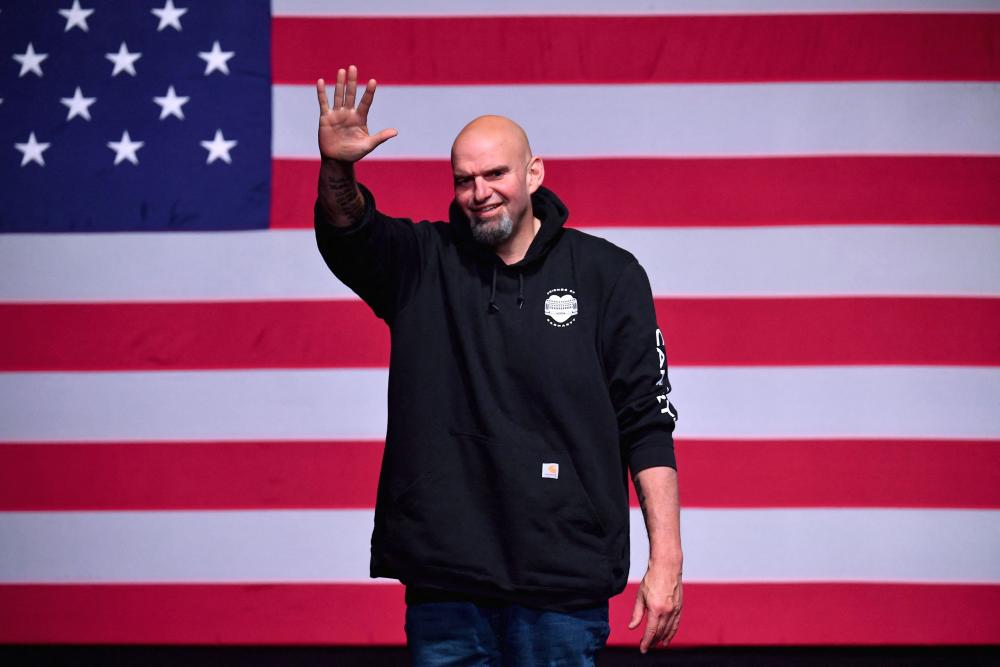-
Posts
2,401 -
Joined
-
Last visited
-
Days Won
91
richardmurray's Achievements
Single Status Update
See all updates by richardmurray
-
The Red Wave (That Wasn't)
The day after Election Day
Dan Rather
and
Elliot Kirschner
3 hr agoDemocrat John Fetterman won the Pennsylvania Senate race. (Photo: Angela Weiss)
And so we wait.Control of the U.S. Senate, and even, improbably, the House of Representatives, is unknown the day after Election Day and will likely remain so for days and possibly weeks to come. It is a stunning turn of events that should force a reckoning across both parties about old assumptions around voting patterns, the choice of candidates, and messaging. Perhaps the political press and the pundit class should engage in some introspection about why so many could have gotten so much so wrong.
As we stand now, there are some things we can say with certainty.
There was no red wave. Not by a long shot. When you consider the political and economic context for this election, Democrats over-performed at a historic scale. As we and others noted many times, the party that doesn’t control the presidency almost always wins, and usually big, in midterm elections. Not this time. And when you add in President Biden’s relatively low popularity, inflation, and the general unease of the nation and the world, it makes the results we are witnessing even more stunning.
It is clear that the Supreme Court tossing away the right for women to have control over their own reproductive choices was rejected by a lot of Americans. Exit polls showed that abortion was a big issue for voters. And abortion rights measures won in several states, including Kentucky, Montana, and Michigan. As a highly partisan and reactionary Supreme Court continues to rule more as politicians than as justices, it will be interesting to see how, or whether, this shapes the electorate. Also, most Republicans who did win election favor severe abortion restrictions. This issue is not going away.
Donald Trump had hoped to take a victory lap this week as his candidates swept into office, culminating with an announcement he is running for president. He may yet make that announcement, but Trumpism by and large fared poorly on Tuesday. In a number of high-profile races, voters recoiled at the chaos of MAGA America, the outrageousness of the Big Lie, and the nihilism of candidates who would destroy our democracy. Heck, even the toxic Lauren Boebert lost her House seat in Colorado.
To be sure, many Republicans who won at all levels of government have pledged their fealty to Trump and his destructive politics. The dangers to our democratic order remain. But we have a clearer sense of the battlefield. Millions and millions of Americans went to the polls and said, “Enough.” It is fair to guess that if Republicans had run more mainstream candidates, they could have had a better night.
One notable exception to this narrative comes from Florida. The state was once a battleground. It now appears to be ruby red under Governor Ron DeSantis. He emerges as a major power in the Republican Party, and it is clear he wants to be president. Many party leaders would love for him to be the standard bearer, but one person who is not on board is Trump.
This dynamic could lead to an intra-party fight the likes of which we have not seen in a long time, if ever. At stake are a few big unknowns: How loyal will the MAGA crowds be to Trump? What about right-wing media? Trump may be wounded and facing major legal jeopardy, but he has always put his personal interests first. If he goes down, he will try to pull others with him, and he doesn’t care a whit about splitting the Republican Party. Dare we say Republicans in disarray?
It is also striking how different the election results are from the way the races were covered. We heard that voter anxiety over inflation, crime, and even immigration would lead to a red wave. We heard that the Democrats were flailing in finding a message that would resonate with the electorate. We heard about major momentum swings. It was considered a given that Democrats would lose the House. And while that might still happen, it is at least going to be close.
We should be reminded anew to take all political prognostications with caution. And the political press perhaps should focus a bit less on the horse race, especially because they aren’t very good handicappers, and a little more on covering the issues that matter. If you want to know what Americans think, you can’t go only to rural diners. As we saw last night, the voters who are shaping this country can also be found in college dorms, Black barber shops, and suburban book clubs. The “average American” isn’t who it was in the 1950s. A diverse, young, and multiethnic United States made a statement this election.
At the same time, Trumpism is not vanquished. The structural challenges to our democracy, such as partisan gerrymandering, the Electoral College, and courts packed with ideological judges, remain. The fight for the soul of this nation continues, but there is a strong constituency for democracy and normalcy.
There is a lot more to say about individual races and broader trends. We will continue to follow the story of American democracy at Steady. For now, however, we can say that there is reason for hope and optimism about the future of this country. Maybe a fever is starting to break. There were Republicans who won last night who are trying to forge a different path forward for their party. We want to have elections between people who differ on policy, not on whether they believe in a constitutional republic based on the principles of freedom and democracy.
So we return to the notion of steady. We can breathe deep, take a moment to reflect on all that is good about our country, and continue the hard work of forging a more perfect union.
My thoughts
My only legal issue with Rather side Kirchner is they don't state with the supreme court how it got to this. In the USA if you want a law to be undeniable, you need the amendment process. But, affirmative action/abortion in any form/open immigration during the 1960s and 1970s wasn't going to get through an amendment process. I daresay absent any statistical proof, it will not now. So, what could the POAJ - party of andrew jackson- do? The supreme court. I am not certain but many or most of the supreme court in the 1960s was placed by POAL presidents . But the Kennedy and LBJ administrations pushed these situations and the supreme court decided. And that decisions making is my one point to the article.
The Supreme court makes decisions not laws. Decisions can change. I concur to the writers that the multiracial/urban population has grown to contain/control/counter/oppose the monoracial/rural population.
But a sad truth is the supreme court's decisions had a large part to play in that in the 1960s, 1970s. and to be blunt those were decisions, not laws. And media need to treat them as decisions.
The question is, why hasn't the Party of Andrew Jackson pushed immigration/abortion/affirmative actions laws to the amendment process? We all know why. They are dead on arrival. So with the Surpreme Court no longer around to be a legal instrument for the POAJ , now that it is a legal instrument for the POAL . It is time to see how the two parts of the USA will end up.
. It is time to see how the two parts of the USA will end up.
One last point, few people in the USA are against freedom or the rule of the people, or a legal framework making the guidelines for rule, ala the constitution.
The issues are, are you willing to accept sharing freedom to a stanger, ala immigration
are you willing to accept opportunity will not be merely for your own , ala affirmative action
are you willing to accept equality in working environment to another who has a physicality different than you or shares a different philosophy, ala abortion.
Many people say , of course, but what happens when your town or city only has so much money for welfare and now thousands of immigrants need welfare too, and the city gives less to all?
What happens when you want your children and nieces and nephews to have jobs but the jobs are allocated to provide greater width of opportunity?
What happens when you accept a pregnancy and the extra financial challenge of it as a lifestyle choice while another doesn't.
I concur, the red wave wasn't, but the United States of America doesn't have a majority strong enough for any waves. The problem is, what happens when people want policy that goes to their heritage or culture, their desires for the fiscal betterment of their family or themselves.
Rural Whites from legal slavery to Jim Crow, to the automotive industrial boom to the jail boom have always benefited by government supporting them.
Do they want that to change? no. Is that opposing freedom? of others, yes. Is it right or wrong? I don't know.
But, no human group wants less, no human group. And no one has the ability to convince a person to cut their opportunity or advantages for another. Opportunities or advantages is why non whites want affirmative action. why women want federally protected abortion. Why immigrants want federally supported immigration.
But why will whites not want those advantages or opportunities to, or want to share them?ARTICLE
https://steady.substack.com/p/the-red-wave-that-wasnt




.thumb.jpg.afc88dfee9cd2927de0c440601caac13.jpg)



.thumb.jpg.ed52910791d00308abb8c218695bec88.jpg)

